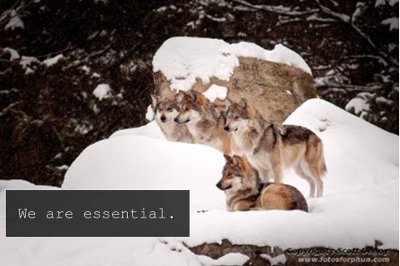Editorial: If Utah can help Mexican wolves recover, we should let them in
 What is Utah’s responsibility to save the Mexican gray wolf?
What is Utah’s responsibility to save the Mexican gray wolf?The letters to the editor page is one of the most widely read, influential parts of the newspaper. One letter from you can reach thousands of people and will also likely be read by decision-makers. Tips and talking points for writing your letter are below, butplease write in your own words, from your own experience. Your letter will be most effective if you focus on a few of the talking points below rather than trying to include them all.
Talking Points
- The state is using out of date information — newer studies support a more northward range for Mexican gray wolves historically. Genetic research has found evidence of Mexican wolf genetic markers in Utah and Colorado, and as far north as Nebraska.
- The Endangered Species Act does not require recovery to occur within species’ historic range.
- It’s hypocritical for the governors to argue that Mexican wolves should be excluded based on whether they are “native.” The state game agencies have no problem moving game species and fish into places they never lived simply for the convenience of hunters and fishermen.
- If Mexican gray wolves need habitat in Utah to survive, I am happy to have them here.
- Recovery of Mexican gray wolves cannot occur wholly in Mexico. There are no large blocks of public lands, there is not a great deal of suitable habitat and prey, and there may not be enough resources to do the job.
- We need wolves, be they Mexican gray wolves or northern wolves, to help repair Utah’s wildlands. Taking a lesson from Yellowstone and the important role of top predators in ecosystems, many of us would welcome lobos to Utah.
- States have failed to manage wildlife as a public trust for current and future citizens. State wildlife policies, which kill off predators to supposedly support game populations, are rooted in the 1800s. Fortunately, our national policy is to restore and preserve all forms of wildlife, including predators. Until the states get serious about balancing conservation vs. consumption, they should recuse themselves from decisions about endangered species.
- For over 10,000 years, grey wolves lived throughout Utah and Colorado and played an important role in shaping the landscape and maintaining balance in nature. Under state management, most subspecies of wolves were hunted and trapped to extinction. The highly endangered Mexican grey wolf is the most appropriate surviving subspecies for recovery in Utah and Colorado, and they cannot recover without help from all four states.
- The US Fish and Wildlife Service should stop letting anti-wolf state officials obstruct wolf recovery. The last effort to create a Mexican wolf recovery plan stalled precisely because the states were given opportunities to weigh in before the work of the scientific experts was released for public comment. The most recent recovery planning process, which began in 2011, ended amidst allegations of political interference by these same states with the science.
- Public Employees for Environmental Responsibility filed a scientific integrity complaint in 2012 saying that US Fish and Wildlife Service allowed politics to interfere with the new Mexican wolf recovery planning process by encouraging scientists to lower or forgo the numeric target for recovery, responding to state demands to exclude Utah, Colorado, and Northern Arizona from suitable habitat, and attempting to prevent the science subgroup from issuing final Mexican wolf recovery criteria.
Letter Writing Tips
Make sure you:
- Thank the paper for publishing this excellent editorial and make sure to reference it in your letter.
- Submit your letter as soon as possible. The chance of your letter being published declines after a day or two since the article was published.
- Do not repeat any negative messages, such as “so and so said that wolves kill too many cows, but”¦” Remember that those reading your letter will not be looking at the article it responds to, so this is an opportunity to get out positive messages about wolf recovery rather than to argue with the original article.
- Keep your letter brief, no more than 200 words. Letters will be edited for space and clarity.
- Include something about who you are and why you care: E.g. “I am a mother, outdoors person, teacher, business owner, scientific, religious, etc.” Don’t be afraid to be personal and creative.
- Provide your name, address, phone number and address. The paper won’t publish these, but they want to know you are who you say you are.
- Submit your letter in the text of your email, rather than as an attachment, here. letters@sltrib.com
_______________________________________________________________________________________________________
Click here to join our email list for Mexican gray wolf updates and action alerts.
Visit us on Facebook here.
Donate to support our work here.



